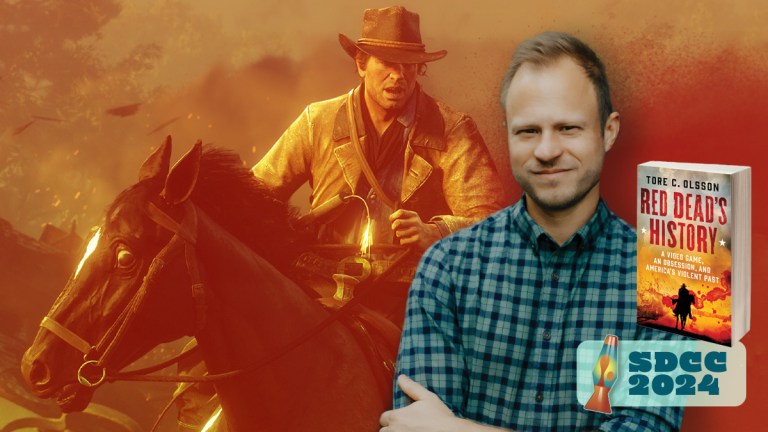The Red Dead Redemption 2 Book That Teaches the Violent History of the American South
Professor Tore C. Olsson on the real-life inspirations of Red Dead Redemption 2 and what we can learn from them.

This article appears in the new issue of DEN OF GEEK magazine. You can read all of our magazine stories here.
As Rockstar Games readies Grand Theft Auto VI, one historian is looking back at the studio’s 2018 mega-hit open-world Western, Red Dead Redemption 2. Professor Tore C. Olsson’s new book, Red Dead’s History, delves into the real-life inspirations for the infamous Van der Linde gang. The audiobook edition is narrated by Roger Clark, the actor who voiced and performed as game protagonist Arthur Morgan, making Red Dead’s History a must-listen for fans of the beloved game.
Before it was a book, “Red Dead’s History” was a course taught by Olsson at the University of Tennessee. It’s not often video games are used as academic course materials, but the depth of Red Dead’s creators’ research impressed the professor, who started playing the game at the urging of a historian colleague.
“The first 20 hours were just like, ‘Oh, I’m playing a video game. This is fun,’” Olsson laughs, chatting with Den of Geek between lectures. “But when the game migrated southeastward into Lemoyne, it was a shock seeing that Red Dead 2 was not just a ‘Western’; it’s a Southern. That’s a genre that’s not nearly as prevalent.”
Southern genre blockbuster films like Gone with the Wind and The Birth of a Nation typically depicted a romanticized, racist view of post-Civil War America. Not so with Red Dead Redemption 2: Black members of the Van der Linde gang react with unease when they’re forced deeper into Lemoyne, and missions highlight clashes between bitter ex-Confederate soldiers, the formerly enslaved, and the Ku Klux Klan. St. Denis, an analog to New Orleans, is the part of the game map Olsson most revisits, marveling at its attention to economics and social movements.
While Rockstar’s game excels at highlighting this lesser-discussed period with nuance, dramatic license was taken for the game’s most iconic symbol, the cowboy.
“John Marston and Arthur Morgan are not cowboys,” Olsson asserts. “Cowboys are the pawns in the game, not the kings.”
The age of outlaw gangs Red Dead presents is actually 30 years too late. By the 1890s, cowboys were more likely to be striking for fair wages than robbing trains. While Red Dead 2’s brutal industrialist baddie Leviticus Cornwall was fictional, 19th-century America was teeming with similar opportunistic robber barons and the Pinkerton agents they hired to bust unions. (See also: HBO’s Deadwood and its third season villain George Hearst, who was very real.)
Red Dead’s History also examines Indigenous characters, including fan-fave gang member Charles Smith and tribal leader Rains Fall, as well as the coal and logging industries of Appalachia (called Roanoke in the game,) a topic close to Olsson’s heart.
“I live in Appalachia. Many of my students self-identify with the Southern mountains as where they’re from. The game does both a good and bad job. It recycles many of those ‘shoeless, toothless’ stereotypes, but it also shows the way that Appalachia was transformed very negatively by people like Leviticus Cornwall, who come in and tear apart the social fabric and contribute to that poverty we see in those stereotypes.”
Olsson may have criticisms from a historian’s perspective, but he’s overwhelmingly a fan of the rich open-world game as an emotional hook to educate students and gamers alike.
“The point of Red Dead’s History is not to ruin Red Dead Redemption 2 for you. It’s to make you passionate about learning some of the heaviest and thorniest dilemmas of American history in this time period,” Olsson says.
Arthur Morgan and his merry band of outlaws, swindlers, whores, and parasites may not be real people, but they feel like they could have been; they laugh, sing songs, fight, have kids, have opinions and prejudices. Though Red Dead Redemption’s sweeping epic confronts American mythology with its cruel, bloody reality, the game also reminds players that history was, ultimately, made by people who were once like us, who must live with—and learn from—others’ past wounds.
Red Dead’s History: A Video Game, an Obsession, and America’s Violent Past by Tore C. Olsson is available Aug. 6.
